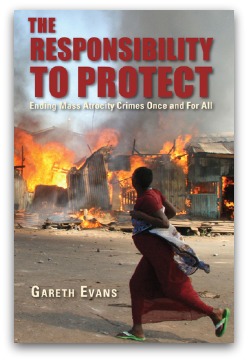Keywords: Un Security Council
There are more than 200 results, only the first 200 are displayed here.
-

AUSTRALIA
- John Falzon
- 19 October 2011
8 Comments
Recently I received an email from a young man in Queensland. He was writing to thank the St Vincent de Paul Society for the stance it takes on the side of people who are demonised for being unemployed. He told me his story. Here are some bits of it.
READ MORE 
-

AUSTRALIA
- Binoy Kampmark
- 23 September 2011
8 Comments
It has been said that giving certain countries independence was like giving a razor to a child. As Palestine makes its bid for full membership of the UN, it may do well to remember that any successful strategy should focus not on statehood but on rights.
READ MORE 
-

RELIGION
- Frank Brennan
- 13 September 2011
5 Comments
The Church of the 21st century should be the exemplar of due process, natural justice and transparency. While there can be little useful critique of the final decision of Pope Benedict to force the early retirement of Bishop Bill Morris, there is plenty of scope to review the processes leading up to it.
READ MORE
-

AUSTRALIA
- Anthony Ham
- 12 September 2011
3 Comments
The disparate strands of Libya's revolution have been held together by a single unifying thread: a visceral desire to oust Gaddafi. Extremely effective as a rallying cry for rebellion, this anti-Gaddafi sentiment is deeply flawed as the unifying narrative for a new nation.
READ MORE 
-

AUSTRALIA
- Shahram Akbarzadeh
- 07 September 2011
4 Comments
The unfolding events in the Arab world are not simply about finding a path to democracy and political openness, but a maze of sectarian tensions and regional power-plays. There is widespread consensus that the opening up of the political space will benefit Islamist forces.
READ MORE 
-

AUSTRALIA
- Binoy Kampmark
- 26 August 2011
2 Comments
Obama and NATO have been lucky that this campaign has worked thus far. To participate in a brutal civil war is always a dangerous game of chance. So far, the rebels have limited their bouts of revenge to arson and looting. A blood bath has not ensued, at least not yet.
READ MORE 
-

AUSTRALIA
- Binoy Kampmark
- 22 August 2011
8 Comments
Walls are not merely concrete manifestations but cultural and psychological ones. One East Berlin native recalled his mother 'cried for hours when the Wall fell'. Israel, in constructing a wall around Jerusalem, faced a host of issues as complex as those that faced East Germany.
READ MORE 
-

RELIGION
- Frank Brennan
- 18 July 2011
5 Comments
When I appeared on Q&A with Christopher Hitchens, a young man asked whether we can 'ever hope to live in a truly secular society' while the religious continue to 'affect political discourse and decision making' on euthanasia, same-sex unions and abortion. Hitchens was simpaticao. I was dumbstruck.
READ MORE
-

RELIGION
- Frank Brennan
- 01 June 2011
5 Comments
At a gallery opening in Bali, the Australia-Indonesia relationship was compared to a rope with many strands, with art and culture the most resilient. In the audience were Australian lawyers who have supported members of the Bali Nine, and lawyers acting for Indonesian minors still held in long term detention in Australia without charge.
READ MORE 
-

ARTS AND CULTURE
There was a liberal use of corporal punishment in my school. We were seen as a loutish bunch of lads who needed a firm hand. It did nothing to help my education. You don't create a smart and confident Australia by taking to people with a stick.
READ MORE 
-

AUSTRALIA
Obama knows the mood could sour quickly in the Middle East and Arab world if the US goes into Libya with ground forces. Yet if the war drags on, Obama will face increasing domestic criticism. Americans are anxious to see stability restored to their oil supplies.
READ MORE 
-

AUSTRALIA
- Ben Coleridge
- 29 March 2011
2 Comments
Many regard the 'Responsibility to Protect' as a doctrine which licences military intervention when civilians' lives are threatened by murderous governments. In fact, R2P emphasises the 'responsibility to prevent' as much as it does the responsibility to intervene.
READ MORE